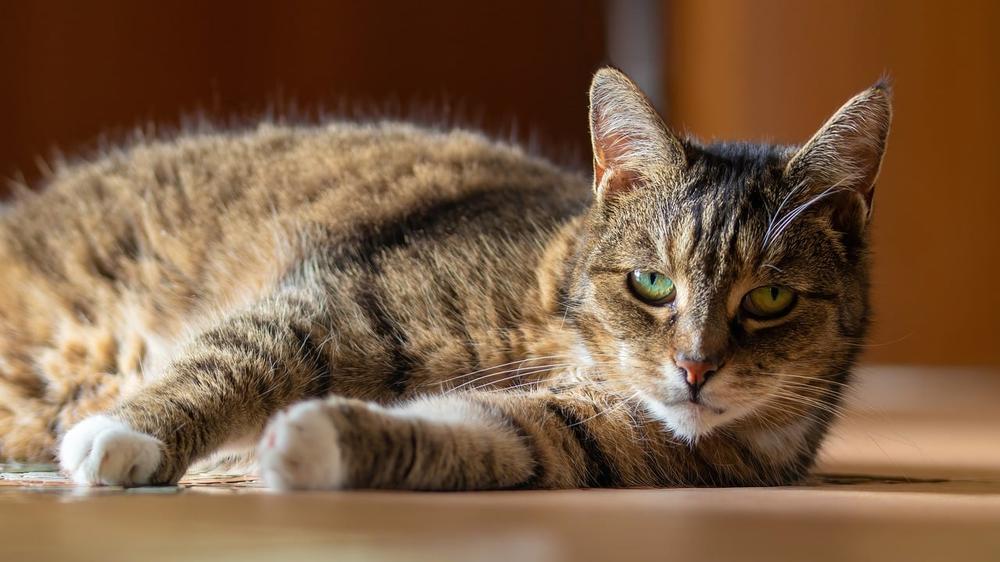Why Does My Cat Attack Me but Not My Husband? (Revealed)

Feel like your cat is plotting against you, launching surprise "attacks" that leave you scratching your head (and maybe your arms)?
But your husband?
Not a scratch.
What gives?
Let's dive into the mystery and uncover some furry secrets together, shall we? 😄
Why Does My Cat Attack Me but Not My Husband?
Your cat attacking you instead of your husband is a curious thing, isn't it? 😺
Let's dive in and explore the reasons.
There could be quite a few explanations for why your furry companion likes to attack you but not your partner.
First off, cats are perceptive creatures.
They pick up on behaviors and body language that they perceive as threatening. It's possible that you unknowingly give off cues that make your cat uneasy.
Another possibility is past negative experiences.
If your cat has had unpleasant encounters with you, it might associate aggression with you specifically.
Pain could also be a factor.
When cats are hurting, they may resort to biting to communicate their discomfort. So, if your kitty is in pain, it might take out its frustration on you.

The amount of time you spend with the cat and who takes care of it daily can have an impact too. If you're the primary caregiver, your cat may see you as a more suitable target for its aggression compared to your husband.
Now, what can you do about this situation?
It's always wise to seek advice from a veterinarian, particularly if you suspect underlying health issues are causing your cat's aggressive behavior.
Understanding the specific factors contributing to your cat's actions will enable you to find appropriate solutions and foster a safe and harmonious relationship with your feline friend.
In conclusion, there can be various causes behind cats attacking their owners while sparing others.
By addressing these factors and consulting professionals, you'll be well on your way to peacefully coexisting with your feisty little pal.
Now, you might be wondering:
What other factors could contribute to a cat's aggressive behavior?
How can you address these issues and ensure a peaceful coexistence with your feline friend?
Let's delve into the next section to uncover more insights:
Reasons Your Cat Attacks You: Overstimulation, Redirected Aggression, Funny Smell
Cats can attack for different reasons, and you must know why. 😾
Here are three main causes:
- Too much excitement: Pay attention to your cat's signals when playing or petting them. If their tail flicks rapidly, ears flatten, or pupils dilate, they may be overwhelmed. Give them space and time to calm down to avoid aggression.
- Aggression redirected: Sometimes cats get upset by something unrelated to you and then take it out on you. For example, if they see another cat outside or had a bad experience with another animal. Take them away from the trigger and create a safe space for them to relax.
- Strange smells: Cats have a keen sense of smell, and certain scents can provoke aggression. Introduce new smells slowly and associate them with positive experiences. Avoid strong odors and sudden loud noises after handling fragrant substances to prevent scent-related aggression.
Hunger, boredom, fear, and jealousy can also play a part in aggression.

Recognizing these triggers and addressing them appropriately will make your home safer and more peaceful for both you and your cat.
Now, you might be wondering what other factors play a role in your cat's aggressive behavior.
Is it solely related to their environment and communication, or could there be underlying health issues at play?
Stick around to find out how to decode your cat's aggression and ensure their all in all well-being...
Understanding Cat Aggression: A Closer Look
To understand why your cat gets aggressive, let's break it down:
- Changes in their environment, like a new pet or disruptions to their routine, can stress out your cat and make them lash out.
- If you don't read your cat's body language, you might miss the signs of their discomfort and accidentally provoke them into a fight.
- It's important to figure out if the aggression is behavior-based or due to a health issue. If they only attack one person, it's probably their attitude. But sudden aggression could indicate sickness, so watch out for other symptoms and maybe see a vet.
- Some rescue cats act aggressively because of traumatic past experiences. Show them understanding by avoiding triggers and making them feel safe.
- Spend quality time hanging out with your cat – it'll help you understand their behavior better and strengthen your bond. Play games that get them thinking so they're less likely to take out their frustrations on you.
- Remember that when your cat gets aggressive, it's often because they're scared or anxious. Identify what's causing those feelings so you can prevent future attacks.
- Pay attention to any weird changes in your cat's habits – they might mean something's wrong health-wise. Regular vet check-ups are key to keeping your furry friend healthy.
If you keep these factors in mind, you can ensure your cat lives happily and peacefully alongside you.

And now, let's delve deeper into why your cat may be displaying aggression towards you but not your husband or partner.
I'd like to share some insights and strategies that have helped me understand and address this behavior.
Cats' Favorite People: Fun Attacks and Apologies!
Ever wondered why your cat attacks you but not your partner?
Despite both of you caring for it, cats have their favorite humans just like we do.
It's not always about treats or grooming; it's about who spends the most time with them and who they feel connected to.
It's 🐱 not always about treats or grooming; it's about who spends the most time with them and who they feel connected to.
Here's the thing: cats value independence and personal space.
They're not into clingy behavior. So while you smother your furry friend with attention, your partner might play hard to get, driving your cat wild.
But don't worry, this aggression is actually a sign of bonding and a request for interaction. It's like a strange love bite.
Your cat may headbutt you, nibble on your fingers, or serenade you with purrs.
These are all indications that you're their chosen human.
The challenge lies in differentiating between rough play and true aggression.
However, there are ways to redirect that energy effectively.
Use interactive toys or play chase games to burn off excess energy and prevent undesirable attacks.
Now, what if your cat only attacks you when you're near your partner?
Jealousy might be the cause.
Cats can be possessive and territorial, so invading their quality time with your significant other could provoke an attack.
Encourage uninterrupted bonding time between your partner and the cat to reduce any jealousy.
Playtime is vital for a healthy relationship with your pet. If you have a high-energy kitty, playing can work wonders in burning off that energy.
Changing a cat's preference isn't easy, but increased interaction and positive reinforcement can improve bonding with other family members.
Give your cat time to adjust if you've recently moved in with your partner.
They may not see you as part of the family yet.
Remember, aggression is never done out of spite.
Sometimes cats bite for attention or because they enjoy rough play, while other times they simply favor one person over another for their own reasons. And yes, some cats even attack just to get any type of attention, whether negative or positive.
So, next time your cat goes into full attack mode, embrace their affectionate and playful ways.
Redirect their energy, build that bond, and it'll be worth it, I promise!
So, if you've ever found yourself wondering why your cat seems to prefer your partner over you, don't worry, you're not alone.
Understanding our furry friends' preferences can be confusing and sometimes frustrating.
But fear not, for I have written a helpful guide to shed some light on this topic.
If you want to uncover possible explanations and get some advice on how to navigate this preference, I highly recommend checking out my article "Why Does My Cat Like My Husband More Than Me".
It will give you valuable insights and tips to strengthen your bond and create harmony with your feline companion.
How to Prevent Cat Attacks
If you want to prevent cat attacks and promote a healthy relationship with your feline friend, follow these tips:
- Observe your cat's body language before petting them. If they seem tense or uncomfortable, respect their need for space.
- Provide appropriate outlets for energy through playtime and toys. This helps reduce aggression caused by boredom or pent-up energy.
- Use positive reinforcement to create a positive association with humans. Reward good behavior with treats and praise.
- Understand and recognize aggressive behavior cues in cats. Knowing the signs can help prevent unintentional attacks.
- Avoid using hands or feet as play objects. This can confuse your cat and lead to aggressive behavior.
- Seek help from a pet behaviorist if necessary. They can provide valuable advice and guidance.
- Create a calm and stress-free environment. Utilize pheromone sprays, provide comfortable resting spots, and ensure regular exercise.
- Train your cat to stop aggressive biting. Consistent training can help redirect their behavior.
- Interact calmly with your cat, avoiding loud noises or sudden movements. Maintain a relaxed atmosphere to prevent scaring your cat.
- Play with your cat before bedtime. This promotes better sleep and helps release excess energy.
Foster a loving and harmonious relationship with your cat, while also avoiding possible attacks by implementing these suggestions.
Preventing Cat Attacks: Essential Tips for Safety
Key Takeaways:
- Aggressive behavior in cats can be caused by various factors, such as pain or being the primary caregiver.
- Cats may attack due to overexcitement, boredom, fear, jealousy, or sensitivity to scents.
- Introduce your scent to the cat and consider changing products with triggering smells.
- Distinguish between aggressive biting and play biting, and neuter male cats to reduce aggression.
- Loud noises and sudden scares can trigger aggression, so take precautions.
- Aggressive behavior is often a result of miscommunication between owner and cat.
- Observing the situation and seeking veterinary help can help address behavioral or health issues.
- Cats may become aggressive due to fear, anxiety, or discomfort with petting.
- Spend time studying a cat's body language and interact with them to understand their behavior.
- Favorite people are chosen based on time spent and may receive affectionate behaviors.
- Engage in activities that burn off energy and allow uninterrupted quality time with the partner.
- Be patient and understanding when the cat does not see you as part of the family yet.
- Use positive reinforcement, play, and pheromones to create a positive relationship with your cat.
- Provide stimulation and respect their need for space to reduce aggression.
- Seek help from a pet behaviorist when necessary and reward good behavior.
And that wraps up today's article.
If you wish to read more of my useful articles, I recommend you check out some of these: Why Is My Cat Bullying My Dog, Why Cat Ducks When I Pet Him, and Why Is My Cat So Desperate for Attention
Talk soon,
-Sarah Davis